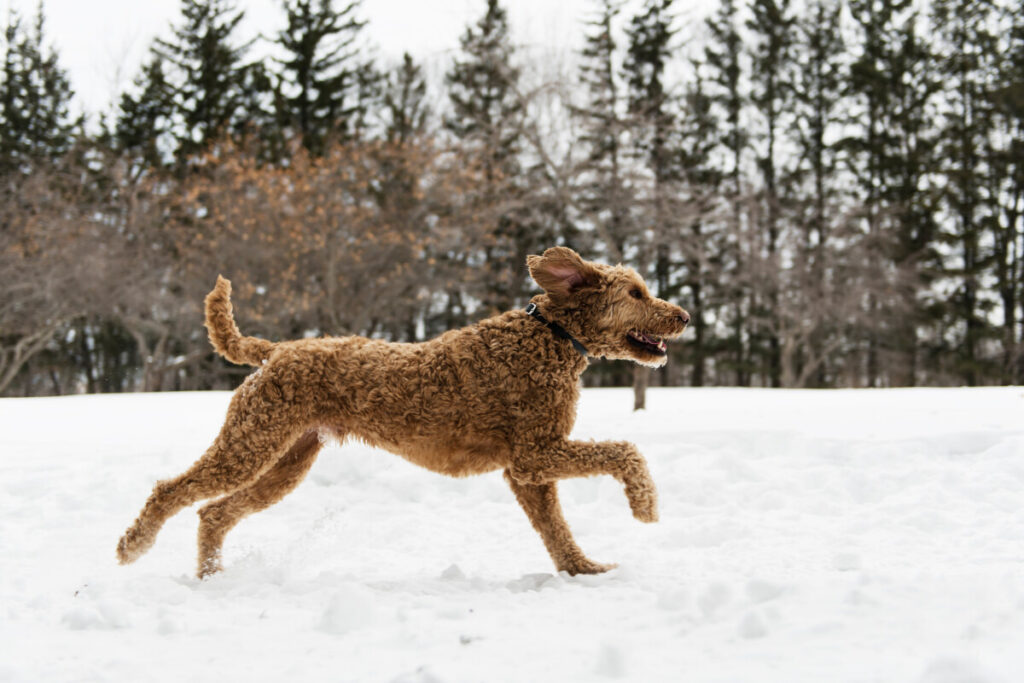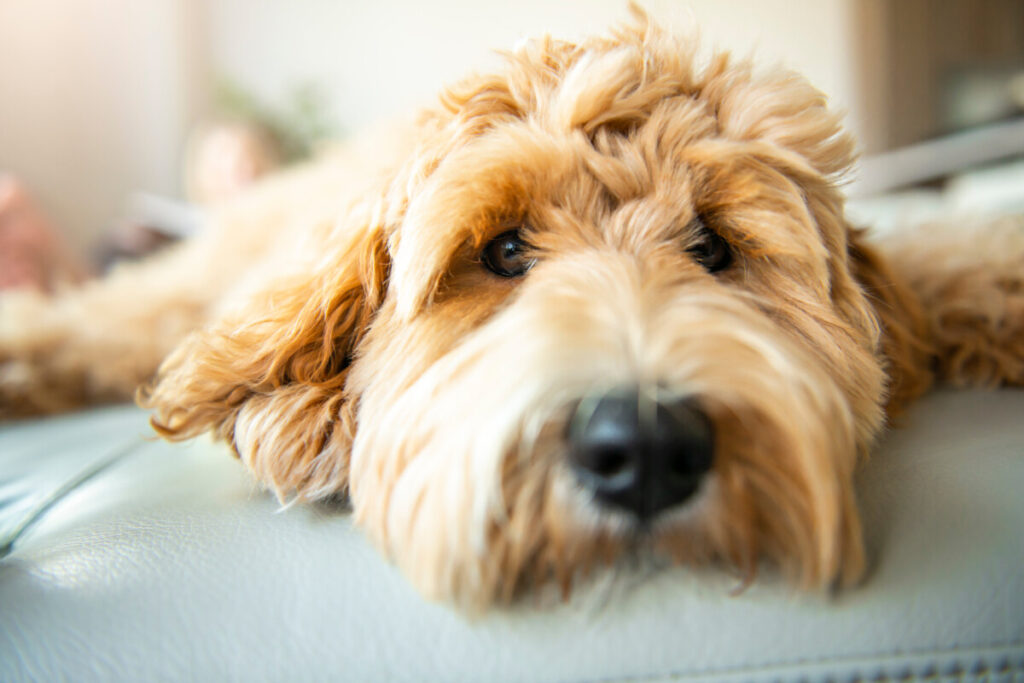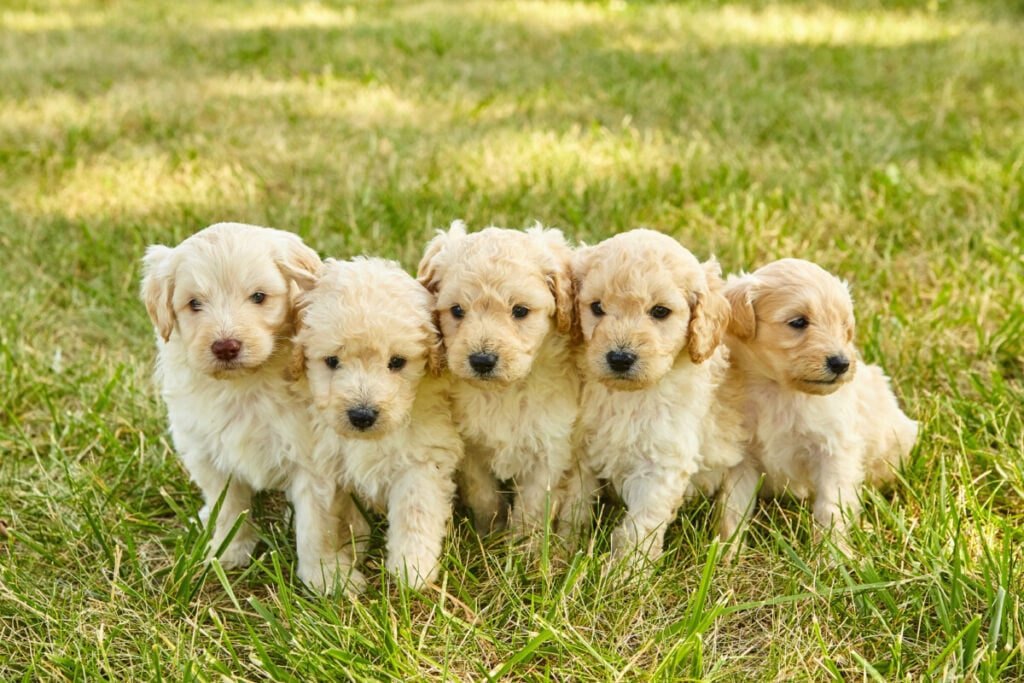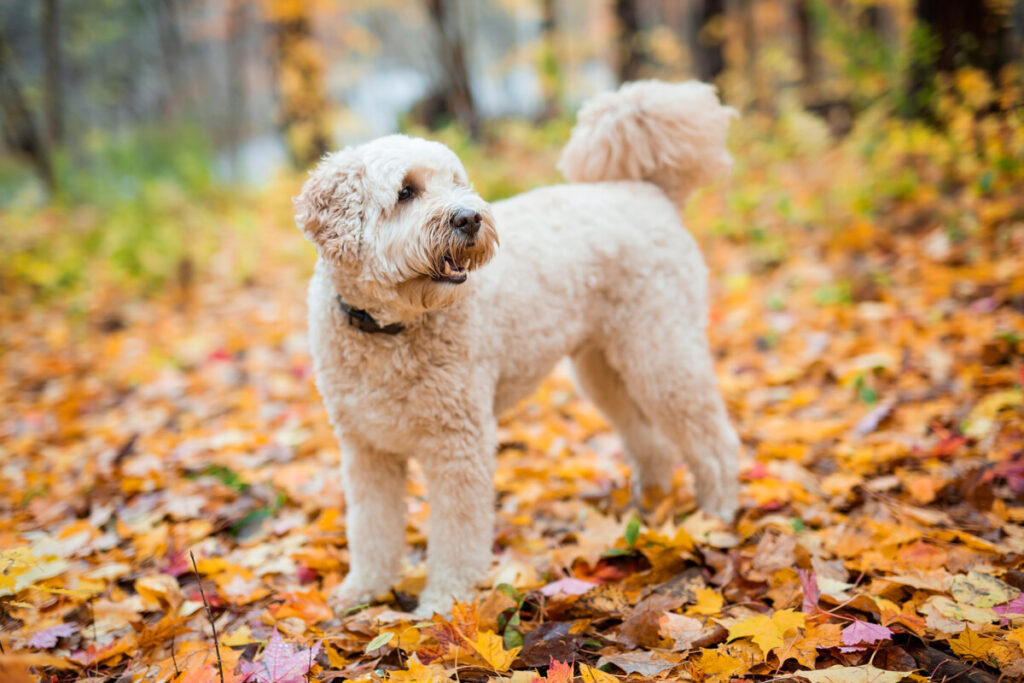Do Goldendoodles get aggressive?
Whether you have little kids, other pets, are around different people a lot, or you just don’t want to deal with it, one of the most important factors in your decision to get a dog is the breed’s aggression. Goldendoodles have recently made it onto your list. Can these cuties get aggressive?

Goldendoodles do not get aggressive, as this is not in their nature. Goldendoodles are primarily very sweet, gentle, and playful. However, they may exhibit aggressive tendencies in unfamiliar environments or if they aren’t socialized or trained correctly. Proper training should begin as puppies.
In this article, we’ll explore any and all aggressive tendencies of Goldendoodles, how to understand them, and how to reduce aggression through simple fixes in training and behavior.
Towards Other Dogs
As Goldendoodles aren’t generally aggressive, it’s easy to assume that they aren’t usually aggressive towards other dogs. Those assumptions are correct: Goldendoodles are very even-tempered and playful, and even if other dogs are exhibiting aggressive tendencies towards them, it will take a lot to set a Goldendoodle off.
If this isn’t the case, and your Goldendoodle is aggressive towards other dogs, all dogs are different, so this may just be that dog’s personality. Otherwise, it could be how the dog has been socialized and trained. In any case, aggression towards other dogs shouldn’t be accepted, and it can be trained out of your Goldendoodle’s behavior if it is present at all.

Towards Children
Goldendoodles are also not usually aggressive towards children, but this doesn’t mean that they won’t be. Because of this, you should avoid leaving young children alone with your dog, just in case. Dogs are unpredictable- it’s in their nature, whether they’re a Goldendoodle or not.
Because of their very playful natures, Goldendoodles are great family pets. However, if they’re playing with children, they’ll only like playing to a certain extent. When your child starts pulling their ears or tail the wrong way or stealing their toys, your Goldendoodle may not enjoy playing anymore, and start to get aggressive.
This is not the dog’s fault. In this case, the children need to be trained on the proper way to respect your dog and play with your dog kindly.
Around Food
This is one area in which you may notice aggressive tendencies from your Goldendoodle. Like all dogs, Goldendoodles are prone to primal survival instincts and can be very possessive of their food. One reason your dog may be aggressive or possessive of their food is that they’re not getting enough of it, so make sure that they are eating enough.
The first step in correcting an actual behavioral problem is to not let your dog eat until you say so. While putting down their bowl, you may notice that they dive for the food, forcing you to pull back quickly. Instead, make sure they sit and stay sitting while you set down the bowl and go back to whatever you’re doing.
If your Goldendoodle is aggressive whenever you touch their bowl, don’t back away. Continue taking it, and they’ll learn eventually. The reason for this is that, if you back away, your dog is rewarded for its aggressive behavior by keeping its bowl and being allowed to continue to eat. Rewarding aggressive behavior won’t ever help it go away.

Biting
In a Goldendoodle, or really any dog, biting or nipping is a natural way to play, especially in puppyhood, and should never be received as an aggressive act from a puppy. This doesn’t mean, though, that you shouldn’t do anything about it. Ignoring the problem will ultimately result in the problem being worse when your dog reaches adulthood.
Chew toys are a great thing to try when your dog has a chewing or biting problem- they just may not know what is okay to chew and what isn’t. If provided with chew toys, your dog is less likely to chew something that they’re not supposed to.
If your adult dog is having a problem with biting, it may be aggression, and it may just be that they weren’t properly trained in their puppyhood. The time-out method is a great one to help with biting or any other bad behavior. Every time your dog bites you, take them to an isolated room, leave the room, and shut the door. Count to ten slowly, then let your dog back out. Repeat this process every time they bite you, and eventually, they’ll learn.
Growling
Though growls can sound mean, these rarely mean aggression from your Goldendoodle but can signal pain, fear, or even playfulness. Growling connected to biting, lunging, or other aggressive behavior is bad and should be addressed immediately.
Like all dogs, Goldendoodles have a variety of reasons for aggressive tendencies. Pain, fear, confusion, anxiety, possession, and even illness can be contributing factors to your dog’s aggression. If your Goldendoodle growls (or does anything else that is uncharacteristically aggressive), immediately stop what you’re doing and try to figure out what’s causing it, just in case.

Tips to Reduce Aggression
There are many ways to reduce aggression in your Goldendoodle. The bottom line is to help your dog feel more at ease. If you do so, your dog may not feel the need to display aggressive behaviors. Below are some tips to help reduce aggressive tendencies in your Goldendoodle.
- Never raise your voice around your dog, even if you’re not yelling at the dog directly.
- Train only using positive reinforcement- this will help you not to accidentally teach your dog that being aggressive is okay.
- Make sure your dog is being stimulated mentally, with fun toys and training exercises.
- Give your dog plenty of exercise through long walks, playing fetch, or morning runs.
Last, but most certainly not least: give your dog the love they deserve! If and when you implement these strategies, you’ll notice improved behavior in your dog in so many areas, not just from an aggression standpoint. Your Goldendoodle will be happier, more well-behaved, and more ready to please than ever before.